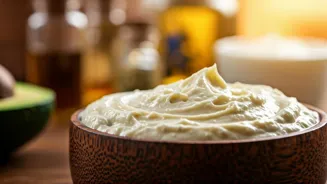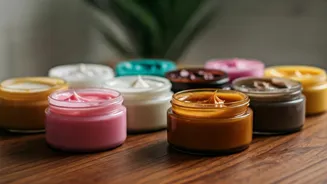Hydration Powerhouses Revealed
For dry and damaged hair, deep hydration is crucial, and several masks excel in this regard. Consider masks rich in ingredients like avocado, known for
its moisturizing fats. Honey, a natural humectant, draws moisture into the hair shaft, while aloe vera soothes the scalp and hydrates the hair. Also, masks incorporating coconut oil are excellent; its small molecular structure lets it penetrate the hair shaft more easily, providing intense hydration. These masks work by forming a protective barrier, preventing moisture loss and leaving your hair feeling soft, supple, and deeply nourished. Look for masks that combine several of these hydrating ingredients for maximum benefit.
Protein Boost for Repair
Damaged hair often suffers from protein loss, leaving it weak and prone to breakage. Protein-rich hair masks can effectively repair this damage. Masks that include ingredients like egg or keratin help rebuild the hair structure. These proteins fill in the gaps caused by damage, strengthening the hair and improving elasticity. However, it's important to balance protein treatments with moisturizing ingredients, as too much protein can make hair feel stiff. Combine protein-rich masks with hydrating ingredients like shea butter or argan oil for optimal results. Regular use of these protein treatments can significantly reduce breakage and improve the overall health and appearance of your hair.
Oil Infusion for Shine
Certain hair masks focus on using the natural benefits of oils to repair and boost the hair. Masks containing argan oil are packed with fatty acids and antioxidants to protect the hair from damage. Jojoba oil is another superb choice; it closely mimics the natural oils produced by the scalp. Both these oils penetrate the hair shaft to nourish it from within, leaving the hair with a radiant shine. For a more traditional approach, masks with amla oil, a staple in Indian hair care, are beneficial. They promote hair growth and reduce hair fall, making the hair appear healthy and lustrous. The key here is regular application to achieve long-lasting benefits, resulting in hair that feels soft, manageable, and full of life.
Shea Butter's Soothing Touch
Shea butter is a rich emollient ingredient that provides deep conditioning and helps repair damage. Shea butter hair masks are particularly beneficial for those with dry, coarse, or chemically treated hair. Shea butter penetrates the hair shaft, providing long-lasting moisture and reducing frizz. It also helps to seal the hair cuticle, preventing further damage. When choosing a shea butter mask, look for one that contains a high concentration of shea butter and is free from harsh chemicals. The mask will create a protective barrier, protecting the hair from environmental stressors. Used regularly, shea butter masks will leave your hair feeling soft, manageable, and incredibly hydrated, promoting overall hair health.
Aloe Vera's Calming Action
Aloe vera hair masks are well-regarded for their ability to soothe and hydrate both the scalp and hair. Aloe vera is known for its anti-inflammatory properties, reducing scalp irritation and promoting a healthy environment for hair growth. These masks are particularly suitable for those with sensitive scalps. The hydrating properties of aloe vera also help to moisturize the hair, making it less prone to breakage. Using aloe vera masks regularly can significantly improve the overall condition of your hair, making it shinier, softer, and more manageable. The natural goodness of aloe vera also provides essential nutrients, promoting overall hair health and vitality.
Honey's Natural Humectancy
Honey's natural humectant properties make it an excellent ingredient for hair masks, effectively drawing moisture from the environment into the hair. Honey helps to hydrate and moisturize dry, damaged hair, restoring its natural shine and softness. It also has antibacterial and antioxidant properties, which can contribute to a healthy scalp and promote hair growth. Honey masks are easily prepared at home, often combined with other ingredients like olive oil or avocado. Applying a honey-based mask regularly can deeply condition and repair your hair. The natural ingredients work together to hydrate, smooth, and protect the hair from damage, leaving it feeling revitalized and incredibly healthy.
Avocado's Deep Conditioning
Avocado, rich in vitamins, minerals, and healthy fats, makes a superior deep conditioning mask for damaged hair. These masks deeply penetrate the hair shaft, providing intense hydration and nourishment. The fats in avocado help seal the hair cuticle, preventing moisture loss and reducing frizz, resulting in smoother, more manageable hair. Masks often combine avocado with other beneficial ingredients like honey or olive oil. Regular use of avocado masks can effectively repair damage and make hair healthier and more resilient. The combination of these ingredients creates a nourishing environment, providing essential nutrients and leaving the hair feeling soft, hydrated, and full of life.
DIY Mask Variations
Customizing your hair mask can enhance its effectiveness, depending on your hair's unique needs. Consider creating DIY masks tailored to address specific concerns. For example, add a dash of apple cider vinegar to your mask for shine and to balance the scalp's pH. Incorporate a few drops of essential oils, like rosemary or lavender, for their stimulating and soothing properties. The versatility of DIY masks allows you to experiment with different ingredients to discover what works best for your hair. These masks offer an accessible and personalized approach, allowing you to focus on the individual needs of your hair, ensuring optimal repair and nourishment. This helps you to achieve the best possible results, promoting healthy and beautiful hair.
Application Techniques Matter
Effective application is just as important as the ingredients in a hair mask. Start by applying the mask to clean, damp hair, ensuring it's evenly distributed from root to tip. Use a wide-toothed comb to detangle and ensure complete coverage. Focus on areas that are most damaged or dry. Leave the mask on for the recommended time, usually 20 to 30 minutes, or as per the product instructions. To enhance the absorption, consider wrapping your hair in a warm towel or using a shower cap, which helps to open the hair cuticles. After the allotted time, rinse thoroughly with lukewarm water, and follow with a gentle shampoo and conditioner. Proper application significantly increases the effectiveness of the mask, resulting in softer, healthier hair.
Consistency for Results
For optimal results, consistent use of hair masks is key. Determine how often you should use a hair mask based on the severity of the damage and your hair type. For very dry or damaged hair, you can use a hair mask up to twice a week. For maintenance and general hydration, once a week may be sufficient. It's also essential to integrate hair masks into a comprehensive hair care routine, including using a mild shampoo and conditioner, and protecting your hair from heat styling and environmental stressors. Regularly applying a hair mask helps maintain the health and vitality of your hair over time. A consistent approach will strengthen your hair, reduce damage, and give your hair a vibrant and healthy look.





